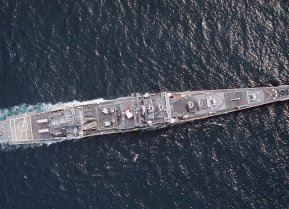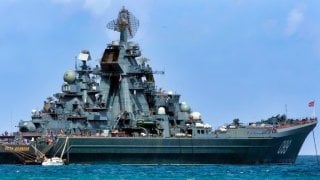One-Third of Russia's Black Sea Fleet Has Been Sunk or Crippled
The Ukrainian Navy, while limited as a combat force, has strategically targeted the Russian Navy's Black Sea Fleet, significantly degrading its operational capabilities.
Summary: The Ukrainian Navy, while limited as a combat force, has strategically targeted the Russian Navy's Black Sea Fleet, significantly degrading its operational capabilities. Nearly a third of the Black Sea Fleet's vessels have been sunk or disabled, including the capture and subsequent targeting of the Kostiantyn Olshansky and the reconnaissance vessel Ivan Khurs in Sevastopol. Ukraine's naval strategy aims to eliminate the Russian naval presence in the Azov and Black Seas. Recent Ukrainian actions have notably reduced Moscow's ability to launch missile strikes from its warships, with significant impacts on the Black Sea Fleet's operations and forcing a reevaluation of Russian naval strategy in the region. This shift represents a significant setback to Russian maritime dominance in the Black Sea, challenging the prior control Moscow held over the area.
The Slow Death of Russian Navy
The Ukrainian Navy doesn't really exist as a fighting force, yet, the same could almost be said of the Russian Navy's Black Sea Fleet – which has seen nearly a third of its warships sunk or disabled. That included the Russian amphibious landing ship Kostiantyn Olshansky, which had been captured by the Kremlin's forces during its illegal annexation of Crimea in 2014.
The former Ukrainian landing ship and the reconnaissance vessel Ivan Khurs were in port in Sevastopol when each came under fire just over a week ago. Kyiv has made targeting the warships a top priority since Russia launched its unprovoked full-scale invasion in February 2022.
"Our ultimate goal is complete absence of military ships of the so-called Russian Federation in the Azov and Black Sea regions," Ukraine Navy spokesperson Captain Dmytro Pletenchuk told the Associated Press.
Last month, two other landing ships – the Yamal and the Azov – were both targeted in port in occupied Sevastopol, while since the start of the year, several smaller patrol ships and a missile-armed corvette have also come under fire.
Though Moscow hasn't commented on the losses, the Kremlin was forced to sack Adm. Nikolai Yevmenov, who was replaced with Adm. Alexander Moiseyev, the commander of the Russian Navy's Northern Fleet.
Russia's Ability to Fire Missile Reduced
Kyiv has, in essence, largely crippled Moscow's ability to launch missile strikes from its warships, Pletenchuk further told Ukrainian media on Saturday.
"Most of the combat units, if you take the carriers of cruise missiles, actually all relocated, except for one," he explained.
According to media reports, only the Karakurt-class corvette Tskilon (Russian for Cyclone), which joined the Russian Navy's Black Sea Fleet in July 2023, is still operating in the region. The small vessel, built in the Crimean city of Kerch, can still pack a considerable punch as it is armed with Kalibr cruise missiles.
However, Pletenchuk described the vessel as a "loser" that "still has not launched a single missile."
As a result of the strikes, the Russian Navy has been forced to operate further from the Ukrainian coast, and according to a military intelligence report from the British Ministry of Defence, most of the Black Sea Fleet's activities are now confined to the eastern Black Sea. There have also been reports that the Kremlin may be planning to construct a new military base at the port of Ochamchire in Abkhazia, a breakaway region of Georgia.
The Black Sea is No Longer a Russian-Controlled Lake
Two years ago, it seemed that the Black Sea was in essence a Russian-controlled lake – one that would be quickly employed to land forces across the Ukrainian coast. However, Moscow's fortunes never materialized.
It was two years ago that the guided-missile frigate Moskva, flagship of the Black Sea Fleet, was sunk by land-based Neptune missiles. It later came to light that U.S. intelligence helped Kyiv target and destroy the warship. The Moskva was the largest military vessel sunk since the Falkland Islands War 40 years earlier.
Author Experience and Expertise: Peter Suciu
Peter Suciu is a Michigan-based writer. He has contributed to more than four dozen magazines, newspapers, and websites with over 3,200 published pieces over a twenty-year career in journalism. He regularly writes about military hardware, firearms history, cybersecurity, politics, and international affairs. Peter is also a Contributing Writer for Forbes and Clearance Jobs. You can follow him on Twitter: @PeterSuciu. You can email the author: [email protected].


